Applying Social Cognitive Theory to Poole Hospital's Employee Behavior
VerifiedAdded on 2022/12/16
|7
|1941
|69
Essay
AI Summary
This essay provides a comprehensive analysis of Poole Hospital through the lens of Social Cognitive Theory (SCT). It examines the impact of organizational changes, specifically the downgrading of the Accident and Emergency department and subsequent restructuring, on employee behavior. The essay explores how personal factors (beliefs, self-efficacy), environmental factors (workplace settings, management decisions), and behavioral factors (employee responses and actions) interact and influence staff motivation, satisfaction, and turnover. The case study highlights the negative consequences of budget cuts, staff shortages, and a lack of focus on patient and employee well-being. The analysis references Bandura's SCT to explain how these factors lead to changes in employee expectations, performance, and overall behavior. The essay concludes by emphasizing the importance of understanding these factors in healthcare management to improve both employee morale and patient care. It references the importance of social cognitive theory in explaining behavior changes.
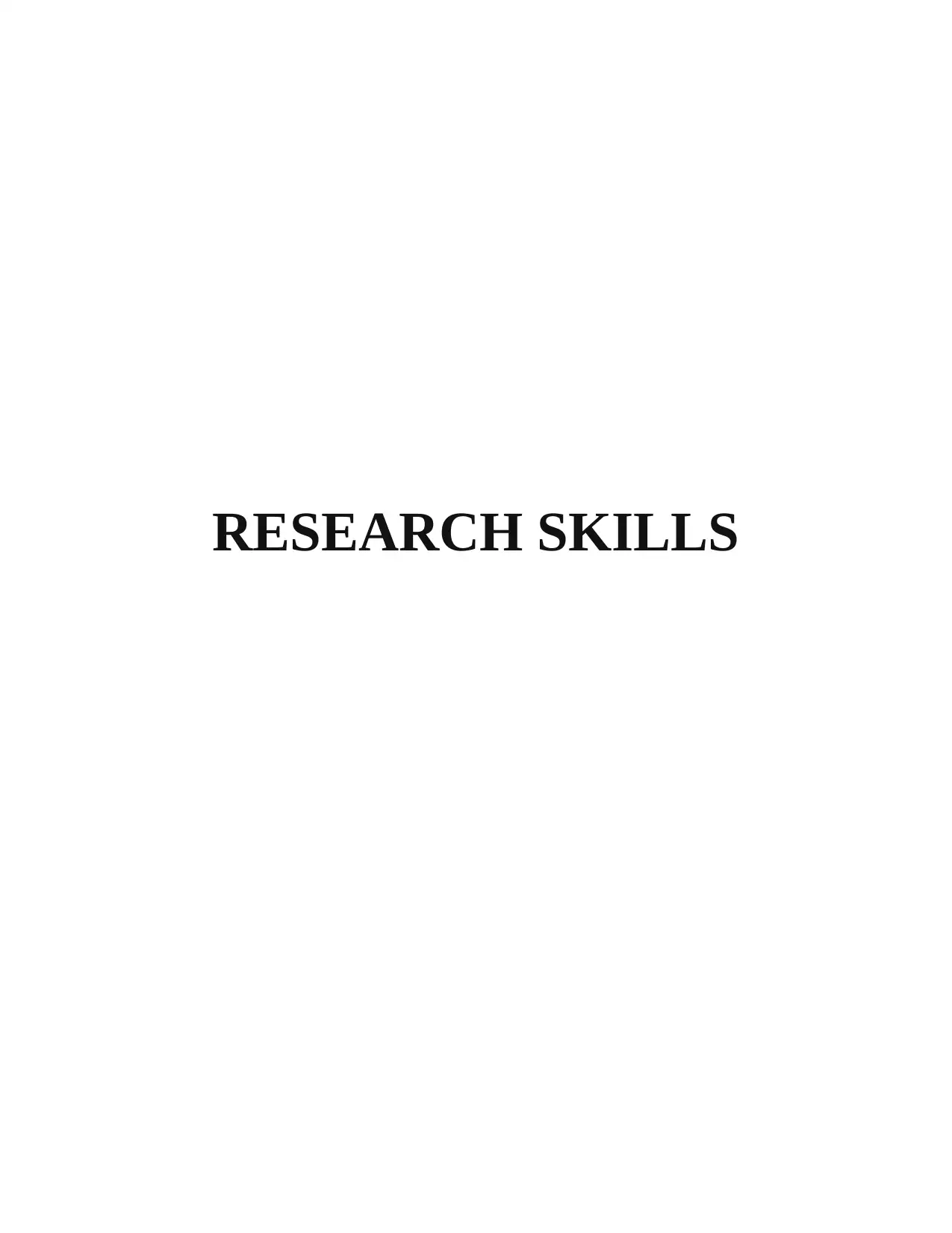
RESEARCH SKILLS
Paraphrase This Document
Need a fresh take? Get an instant paraphrase of this document with our AI Paraphraser
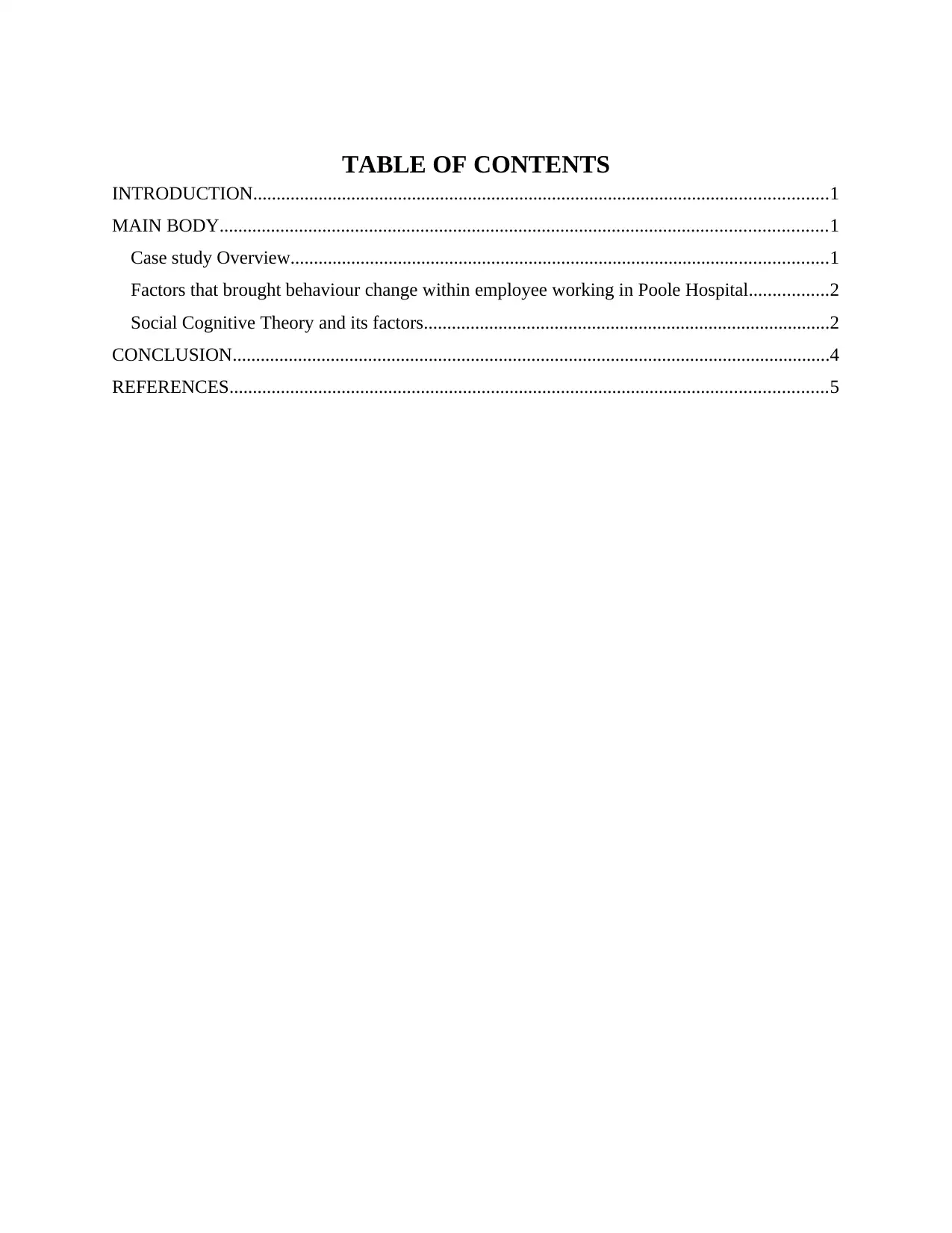
TABLE OF CONTENTS
INTRODUCTION...........................................................................................................................1
MAIN BODY..................................................................................................................................1
Case study Overview...................................................................................................................1
Factors that brought behaviour change within employee working in Poole Hospital.................2
Social Cognitive Theory and its factors.......................................................................................2
CONCLUSION................................................................................................................................4
REFERENCES................................................................................................................................5
INTRODUCTION...........................................................................................................................1
MAIN BODY..................................................................................................................................1
Case study Overview...................................................................................................................1
Factors that brought behaviour change within employee working in Poole Hospital.................2
Social Cognitive Theory and its factors.......................................................................................2
CONCLUSION................................................................................................................................4
REFERENCES................................................................................................................................5
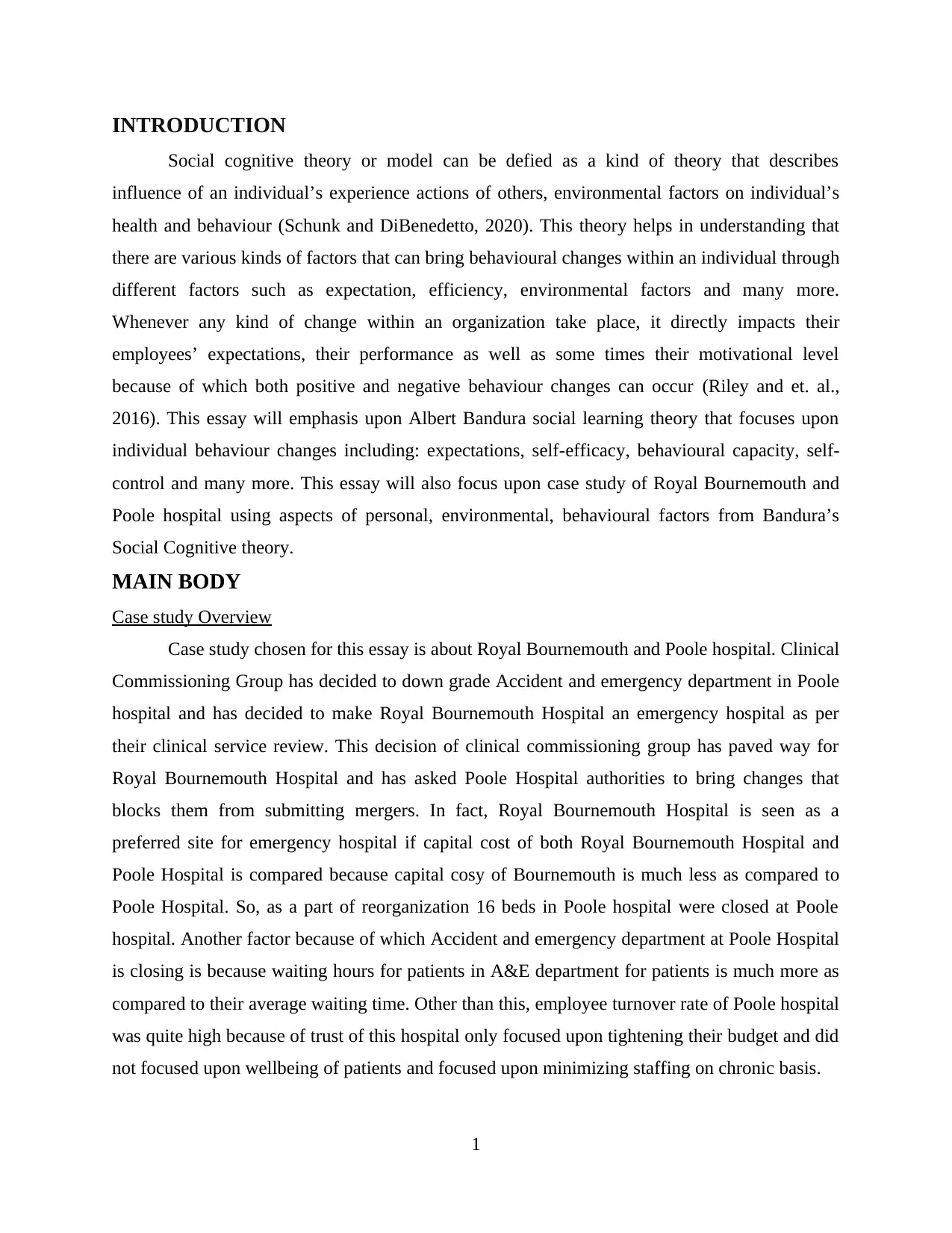
INTRODUCTION
Social cognitive theory or model can be defied as a kind of theory that describes
influence of an individual’s experience actions of others, environmental factors on individual’s
health and behaviour (Schunk and DiBenedetto, 2020). This theory helps in understanding that
there are various kinds of factors that can bring behavioural changes within an individual through
different factors such as expectation, efficiency, environmental factors and many more.
Whenever any kind of change within an organization take place, it directly impacts their
employees’ expectations, their performance as well as some times their motivational level
because of which both positive and negative behaviour changes can occur (Riley and et. al.,
2016). This essay will emphasis upon Albert Bandura social learning theory that focuses upon
individual behaviour changes including: expectations, self-efficacy, behavioural capacity, self-
control and many more. This essay will also focus upon case study of Royal Bournemouth and
Poole hospital using aspects of personal, environmental, behavioural factors from Bandura’s
Social Cognitive theory.
MAIN BODY
Case study Overview
Case study chosen for this essay is about Royal Bournemouth and Poole hospital. Clinical
Commissioning Group has decided to down grade Accident and emergency department in Poole
hospital and has decided to make Royal Bournemouth Hospital an emergency hospital as per
their clinical service review. This decision of clinical commissioning group has paved way for
Royal Bournemouth Hospital and has asked Poole Hospital authorities to bring changes that
blocks them from submitting mergers. In fact, Royal Bournemouth Hospital is seen as a
preferred site for emergency hospital if capital cost of both Royal Bournemouth Hospital and
Poole Hospital is compared because capital cosy of Bournemouth is much less as compared to
Poole Hospital. So, as a part of reorganization 16 beds in Poole hospital were closed at Poole
hospital. Another factor because of which Accident and emergency department at Poole Hospital
is closing is because waiting hours for patients in A&E department for patients is much more as
compared to their average waiting time. Other than this, employee turnover rate of Poole hospital
was quite high because of trust of this hospital only focused upon tightening their budget and did
not focused upon wellbeing of patients and focused upon minimizing staffing on chronic basis.
1
Social cognitive theory or model can be defied as a kind of theory that describes
influence of an individual’s experience actions of others, environmental factors on individual’s
health and behaviour (Schunk and DiBenedetto, 2020). This theory helps in understanding that
there are various kinds of factors that can bring behavioural changes within an individual through
different factors such as expectation, efficiency, environmental factors and many more.
Whenever any kind of change within an organization take place, it directly impacts their
employees’ expectations, their performance as well as some times their motivational level
because of which both positive and negative behaviour changes can occur (Riley and et. al.,
2016). This essay will emphasis upon Albert Bandura social learning theory that focuses upon
individual behaviour changes including: expectations, self-efficacy, behavioural capacity, self-
control and many more. This essay will also focus upon case study of Royal Bournemouth and
Poole hospital using aspects of personal, environmental, behavioural factors from Bandura’s
Social Cognitive theory.
MAIN BODY
Case study Overview
Case study chosen for this essay is about Royal Bournemouth and Poole hospital. Clinical
Commissioning Group has decided to down grade Accident and emergency department in Poole
hospital and has decided to make Royal Bournemouth Hospital an emergency hospital as per
their clinical service review. This decision of clinical commissioning group has paved way for
Royal Bournemouth Hospital and has asked Poole Hospital authorities to bring changes that
blocks them from submitting mergers. In fact, Royal Bournemouth Hospital is seen as a
preferred site for emergency hospital if capital cost of both Royal Bournemouth Hospital and
Poole Hospital is compared because capital cosy of Bournemouth is much less as compared to
Poole Hospital. So, as a part of reorganization 16 beds in Poole hospital were closed at Poole
hospital. Another factor because of which Accident and emergency department at Poole Hospital
is closing is because waiting hours for patients in A&E department for patients is much more as
compared to their average waiting time. Other than this, employee turnover rate of Poole hospital
was quite high because of trust of this hospital only focused upon tightening their budget and did
not focused upon wellbeing of patients and focused upon minimizing staffing on chronic basis.
1
⊘ This is a preview!⊘
Do you want full access?
Subscribe today to unlock all pages.

Trusted by 1+ million students worldwide
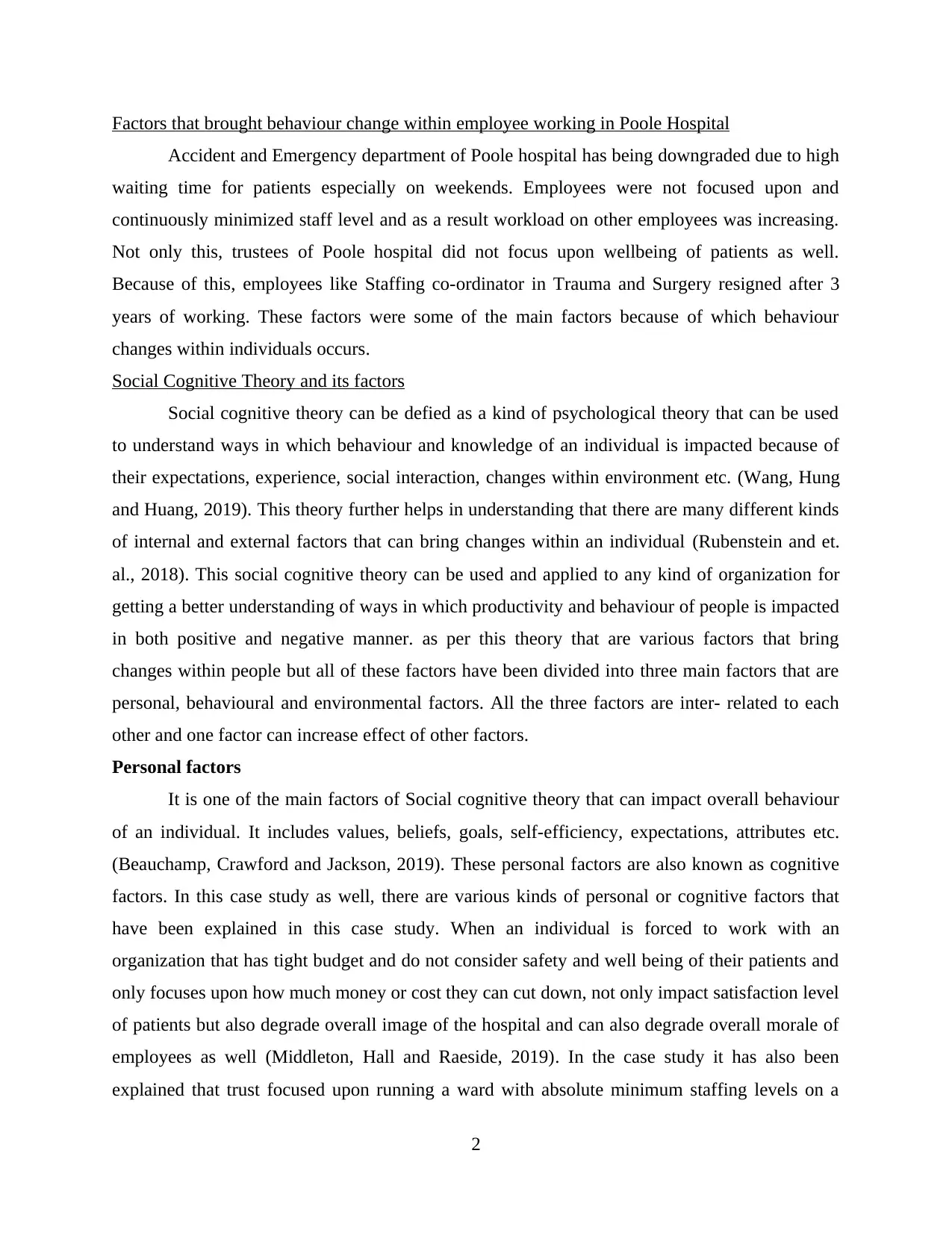
Factors that brought behaviour change within employee working in Poole Hospital
Accident and Emergency department of Poole hospital has being downgraded due to high
waiting time for patients especially on weekends. Employees were not focused upon and
continuously minimized staff level and as a result workload on other employees was increasing.
Not only this, trustees of Poole hospital did not focus upon wellbeing of patients as well.
Because of this, employees like Staffing co-ordinator in Trauma and Surgery resigned after 3
years of working. These factors were some of the main factors because of which behaviour
changes within individuals occurs.
Social Cognitive Theory and its factors
Social cognitive theory can be defied as a kind of psychological theory that can be used
to understand ways in which behaviour and knowledge of an individual is impacted because of
their expectations, experience, social interaction, changes within environment etc. (Wang, Hung
and Huang, 2019). This theory further helps in understanding that there are many different kinds
of internal and external factors that can bring changes within an individual (Rubenstein and et.
al., 2018). This social cognitive theory can be used and applied to any kind of organization for
getting a better understanding of ways in which productivity and behaviour of people is impacted
in both positive and negative manner. as per this theory that are various factors that bring
changes within people but all of these factors have been divided into three main factors that are
personal, behavioural and environmental factors. All the three factors are inter- related to each
other and one factor can increase effect of other factors.
Personal factors
It is one of the main factors of Social cognitive theory that can impact overall behaviour
of an individual. It includes values, beliefs, goals, self-efficiency, expectations, attributes etc.
(Beauchamp, Crawford and Jackson, 2019). These personal factors are also known as cognitive
factors. In this case study as well, there are various kinds of personal or cognitive factors that
have been explained in this case study. When an individual is forced to work with an
organization that has tight budget and do not consider safety and well being of their patients and
only focuses upon how much money or cost they can cut down, not only impact satisfaction level
of patients but also degrade overall image of the hospital and can also degrade overall morale of
employees as well (Middleton, Hall and Raeside, 2019). In the case study it has also been
explained that trust focused upon running a ward with absolute minimum staffing levels on a
2
Accident and Emergency department of Poole hospital has being downgraded due to high
waiting time for patients especially on weekends. Employees were not focused upon and
continuously minimized staff level and as a result workload on other employees was increasing.
Not only this, trustees of Poole hospital did not focus upon wellbeing of patients as well.
Because of this, employees like Staffing co-ordinator in Trauma and Surgery resigned after 3
years of working. These factors were some of the main factors because of which behaviour
changes within individuals occurs.
Social Cognitive Theory and its factors
Social cognitive theory can be defied as a kind of psychological theory that can be used
to understand ways in which behaviour and knowledge of an individual is impacted because of
their expectations, experience, social interaction, changes within environment etc. (Wang, Hung
and Huang, 2019). This theory further helps in understanding that there are many different kinds
of internal and external factors that can bring changes within an individual (Rubenstein and et.
al., 2018). This social cognitive theory can be used and applied to any kind of organization for
getting a better understanding of ways in which productivity and behaviour of people is impacted
in both positive and negative manner. as per this theory that are various factors that bring
changes within people but all of these factors have been divided into three main factors that are
personal, behavioural and environmental factors. All the three factors are inter- related to each
other and one factor can increase effect of other factors.
Personal factors
It is one of the main factors of Social cognitive theory that can impact overall behaviour
of an individual. It includes values, beliefs, goals, self-efficiency, expectations, attributes etc.
(Beauchamp, Crawford and Jackson, 2019). These personal factors are also known as cognitive
factors. In this case study as well, there are various kinds of personal or cognitive factors that
have been explained in this case study. When an individual is forced to work with an
organization that has tight budget and do not consider safety and well being of their patients and
only focuses upon how much money or cost they can cut down, not only impact satisfaction level
of patients but also degrade overall image of the hospital and can also degrade overall morale of
employees as well (Middleton, Hall and Raeside, 2019). In the case study it has also been
explained that trust focused upon running a ward with absolute minimum staffing levels on a
2
Paraphrase This Document
Need a fresh take? Get an instant paraphrase of this document with our AI Paraphraser
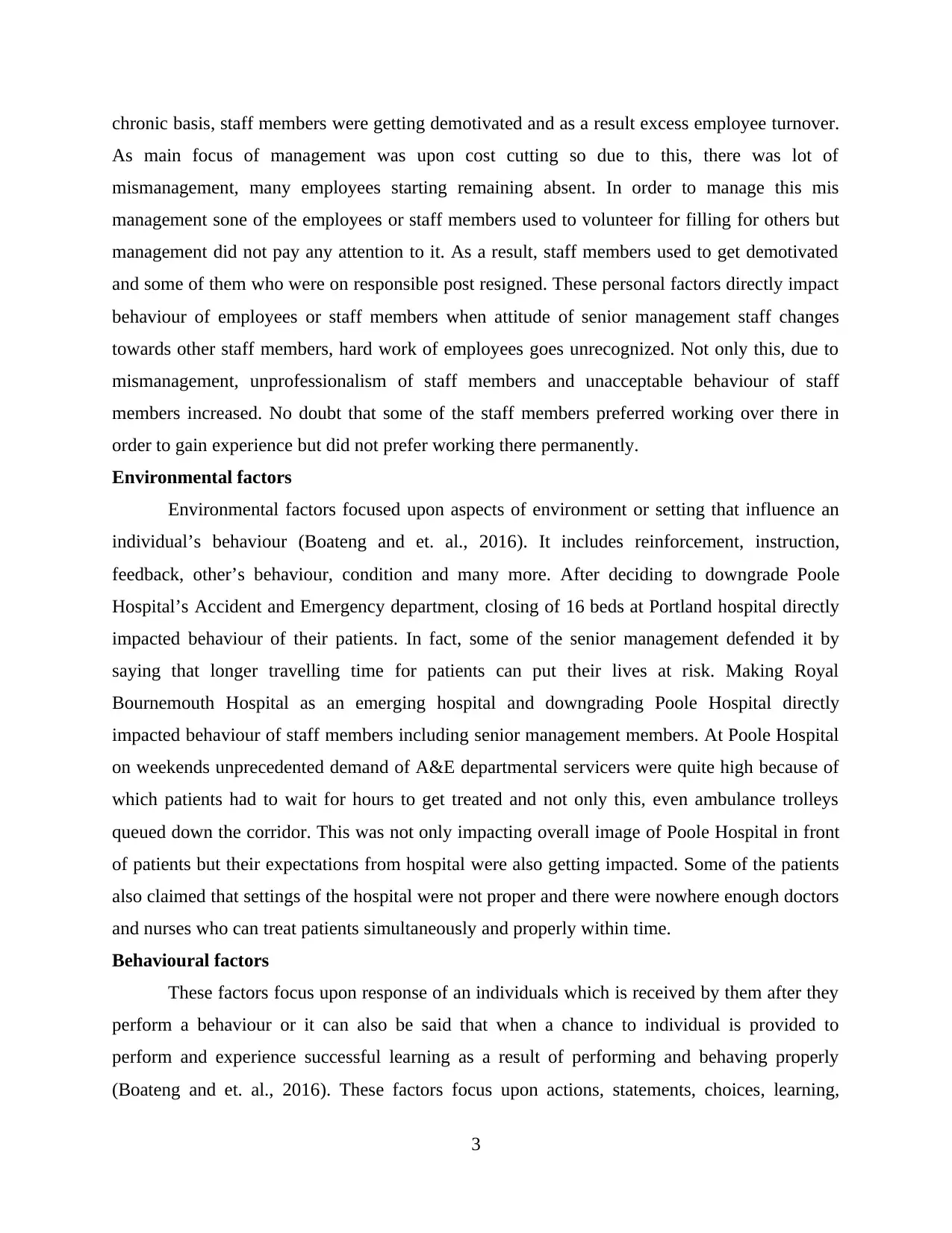
chronic basis, staff members were getting demotivated and as a result excess employee turnover.
As main focus of management was upon cost cutting so due to this, there was lot of
mismanagement, many employees starting remaining absent. In order to manage this mis
management sone of the employees or staff members used to volunteer for filling for others but
management did not pay any attention to it. As a result, staff members used to get demotivated
and some of them who were on responsible post resigned. These personal factors directly impact
behaviour of employees or staff members when attitude of senior management staff changes
towards other staff members, hard work of employees goes unrecognized. Not only this, due to
mismanagement, unprofessionalism of staff members and unacceptable behaviour of staff
members increased. No doubt that some of the staff members preferred working over there in
order to gain experience but did not prefer working there permanently.
Environmental factors
Environmental factors focused upon aspects of environment or setting that influence an
individual’s behaviour (Boateng and et. al., 2016). It includes reinforcement, instruction,
feedback, other’s behaviour, condition and many more. After deciding to downgrade Poole
Hospital’s Accident and Emergency department, closing of 16 beds at Portland hospital directly
impacted behaviour of their patients. In fact, some of the senior management defended it by
saying that longer travelling time for patients can put their lives at risk. Making Royal
Bournemouth Hospital as an emerging hospital and downgrading Poole Hospital directly
impacted behaviour of staff members including senior management members. At Poole Hospital
on weekends unprecedented demand of A&E departmental servicers were quite high because of
which patients had to wait for hours to get treated and not only this, even ambulance trolleys
queued down the corridor. This was not only impacting overall image of Poole Hospital in front
of patients but their expectations from hospital were also getting impacted. Some of the patients
also claimed that settings of the hospital were not proper and there were nowhere enough doctors
and nurses who can treat patients simultaneously and properly within time.
Behavioural factors
These factors focus upon response of an individuals which is received by them after they
perform a behaviour or it can also be said that when a chance to individual is provided to
perform and experience successful learning as a result of performing and behaving properly
(Boateng and et. al., 2016). These factors focus upon actions, statements, choices, learning,
3
As main focus of management was upon cost cutting so due to this, there was lot of
mismanagement, many employees starting remaining absent. In order to manage this mis
management sone of the employees or staff members used to volunteer for filling for others but
management did not pay any attention to it. As a result, staff members used to get demotivated
and some of them who were on responsible post resigned. These personal factors directly impact
behaviour of employees or staff members when attitude of senior management staff changes
towards other staff members, hard work of employees goes unrecognized. Not only this, due to
mismanagement, unprofessionalism of staff members and unacceptable behaviour of staff
members increased. No doubt that some of the staff members preferred working over there in
order to gain experience but did not prefer working there permanently.
Environmental factors
Environmental factors focused upon aspects of environment or setting that influence an
individual’s behaviour (Boateng and et. al., 2016). It includes reinforcement, instruction,
feedback, other’s behaviour, condition and many more. After deciding to downgrade Poole
Hospital’s Accident and Emergency department, closing of 16 beds at Portland hospital directly
impacted behaviour of their patients. In fact, some of the senior management defended it by
saying that longer travelling time for patients can put their lives at risk. Making Royal
Bournemouth Hospital as an emerging hospital and downgrading Poole Hospital directly
impacted behaviour of staff members including senior management members. At Poole Hospital
on weekends unprecedented demand of A&E departmental servicers were quite high because of
which patients had to wait for hours to get treated and not only this, even ambulance trolleys
queued down the corridor. This was not only impacting overall image of Poole Hospital in front
of patients but their expectations from hospital were also getting impacted. Some of the patients
also claimed that settings of the hospital were not proper and there were nowhere enough doctors
and nurses who can treat patients simultaneously and properly within time.
Behavioural factors
These factors focus upon response of an individuals which is received by them after they
perform a behaviour or it can also be said that when a chance to individual is provided to
perform and experience successful learning as a result of performing and behaving properly
(Boateng and et. al., 2016). These factors focus upon actions, statements, choices, learning,
3
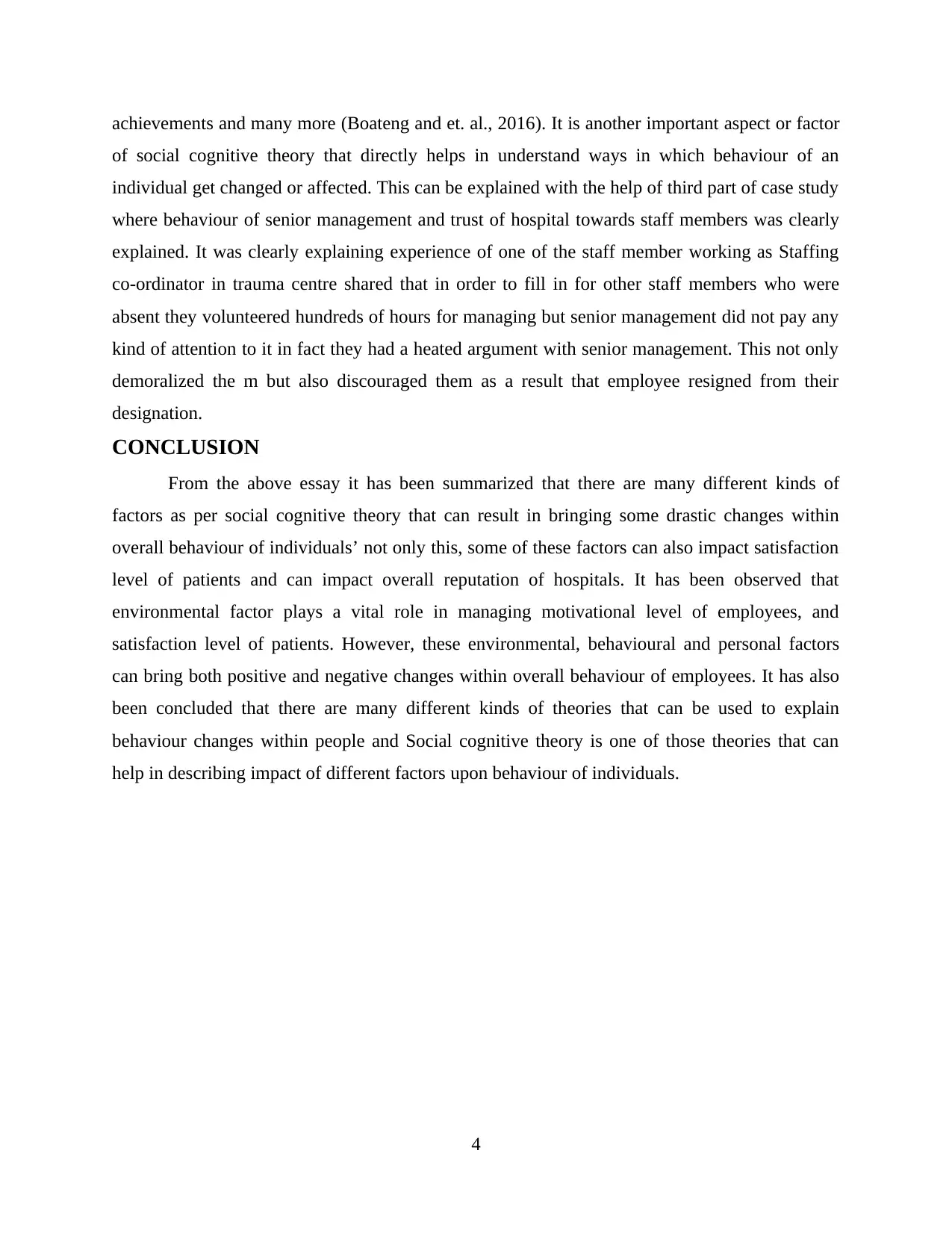
achievements and many more (Boateng and et. al., 2016). It is another important aspect or factor
of social cognitive theory that directly helps in understand ways in which behaviour of an
individual get changed or affected. This can be explained with the help of third part of case study
where behaviour of senior management and trust of hospital towards staff members was clearly
explained. It was clearly explaining experience of one of the staff member working as Staffing
co-ordinator in trauma centre shared that in order to fill in for other staff members who were
absent they volunteered hundreds of hours for managing but senior management did not pay any
kind of attention to it in fact they had a heated argument with senior management. This not only
demoralized the m but also discouraged them as a result that employee resigned from their
designation.
CONCLUSION
From the above essay it has been summarized that there are many different kinds of
factors as per social cognitive theory that can result in bringing some drastic changes within
overall behaviour of individuals’ not only this, some of these factors can also impact satisfaction
level of patients and can impact overall reputation of hospitals. It has been observed that
environmental factor plays a vital role in managing motivational level of employees, and
satisfaction level of patients. However, these environmental, behavioural and personal factors
can bring both positive and negative changes within overall behaviour of employees. It has also
been concluded that there are many different kinds of theories that can be used to explain
behaviour changes within people and Social cognitive theory is one of those theories that can
help in describing impact of different factors upon behaviour of individuals.
4
of social cognitive theory that directly helps in understand ways in which behaviour of an
individual get changed or affected. This can be explained with the help of third part of case study
where behaviour of senior management and trust of hospital towards staff members was clearly
explained. It was clearly explaining experience of one of the staff member working as Staffing
co-ordinator in trauma centre shared that in order to fill in for other staff members who were
absent they volunteered hundreds of hours for managing but senior management did not pay any
kind of attention to it in fact they had a heated argument with senior management. This not only
demoralized the m but also discouraged them as a result that employee resigned from their
designation.
CONCLUSION
From the above essay it has been summarized that there are many different kinds of
factors as per social cognitive theory that can result in bringing some drastic changes within
overall behaviour of individuals’ not only this, some of these factors can also impact satisfaction
level of patients and can impact overall reputation of hospitals. It has been observed that
environmental factor plays a vital role in managing motivational level of employees, and
satisfaction level of patients. However, these environmental, behavioural and personal factors
can bring both positive and negative changes within overall behaviour of employees. It has also
been concluded that there are many different kinds of theories that can be used to explain
behaviour changes within people and Social cognitive theory is one of those theories that can
help in describing impact of different factors upon behaviour of individuals.
4
⊘ This is a preview!⊘
Do you want full access?
Subscribe today to unlock all pages.

Trusted by 1+ million students worldwide
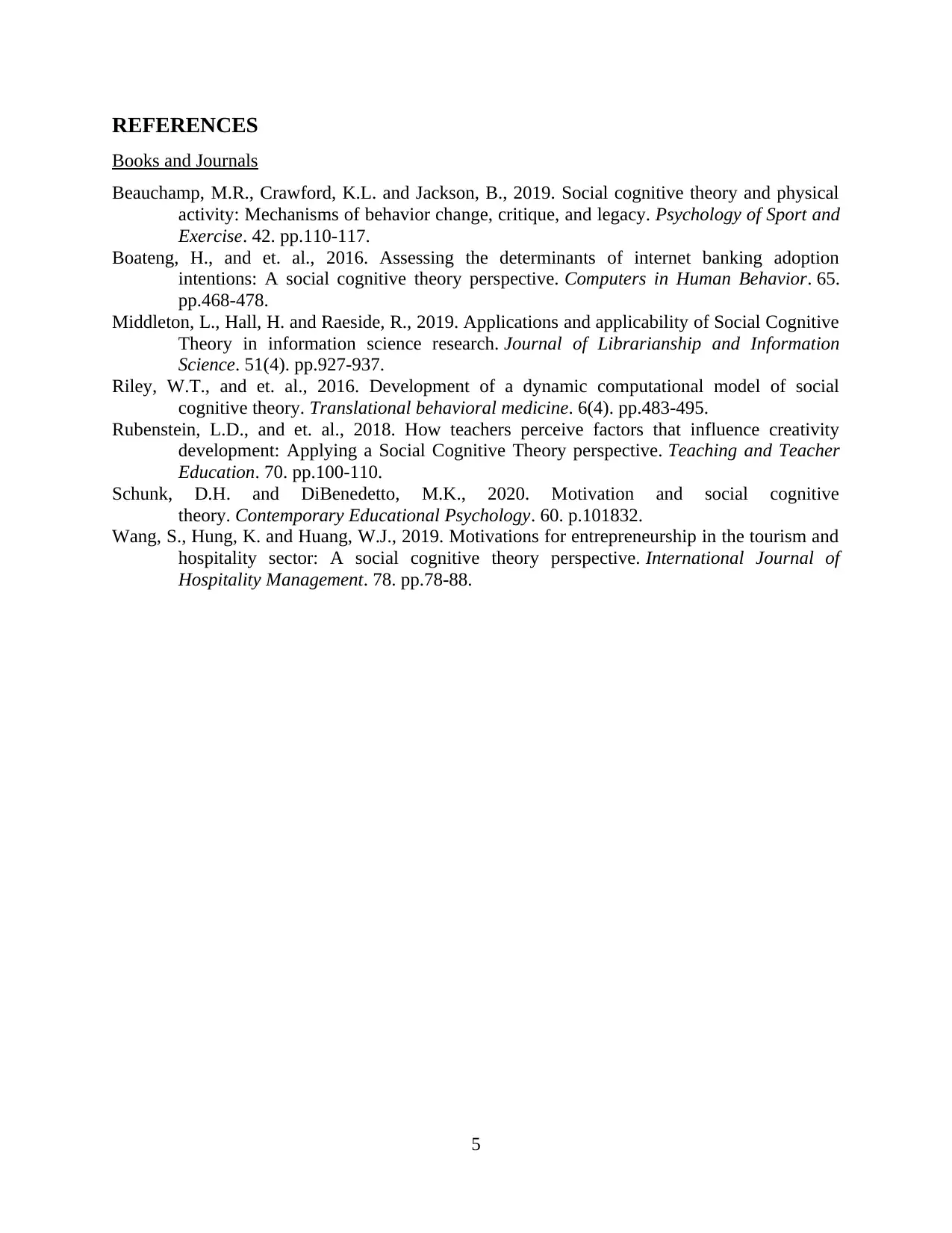
REFERENCES
Books and Journals
Beauchamp, M.R., Crawford, K.L. and Jackson, B., 2019. Social cognitive theory and physical
activity: Mechanisms of behavior change, critique, and legacy. Psychology of Sport and
Exercise. 42. pp.110-117.
Boateng, H., and et. al., 2016. Assessing the determinants of internet banking adoption
intentions: A social cognitive theory perspective. Computers in Human Behavior. 65.
pp.468-478.
Middleton, L., Hall, H. and Raeside, R., 2019. Applications and applicability of Social Cognitive
Theory in information science research. Journal of Librarianship and Information
Science. 51(4). pp.927-937.
Riley, W.T., and et. al., 2016. Development of a dynamic computational model of social
cognitive theory. Translational behavioral medicine. 6(4). pp.483-495.
Rubenstein, L.D., and et. al., 2018. How teachers perceive factors that influence creativity
development: Applying a Social Cognitive Theory perspective. Teaching and Teacher
Education. 70. pp.100-110.
Schunk, D.H. and DiBenedetto, M.K., 2020. Motivation and social cognitive
theory. Contemporary Educational Psychology. 60. p.101832.
Wang, S., Hung, K. and Huang, W.J., 2019. Motivations for entrepreneurship in the tourism and
hospitality sector: A social cognitive theory perspective. International Journal of
Hospitality Management. 78. pp.78-88.
5
Books and Journals
Beauchamp, M.R., Crawford, K.L. and Jackson, B., 2019. Social cognitive theory and physical
activity: Mechanisms of behavior change, critique, and legacy. Psychology of Sport and
Exercise. 42. pp.110-117.
Boateng, H., and et. al., 2016. Assessing the determinants of internet banking adoption
intentions: A social cognitive theory perspective. Computers in Human Behavior. 65.
pp.468-478.
Middleton, L., Hall, H. and Raeside, R., 2019. Applications and applicability of Social Cognitive
Theory in information science research. Journal of Librarianship and Information
Science. 51(4). pp.927-937.
Riley, W.T., and et. al., 2016. Development of a dynamic computational model of social
cognitive theory. Translational behavioral medicine. 6(4). pp.483-495.
Rubenstein, L.D., and et. al., 2018. How teachers perceive factors that influence creativity
development: Applying a Social Cognitive Theory perspective. Teaching and Teacher
Education. 70. pp.100-110.
Schunk, D.H. and DiBenedetto, M.K., 2020. Motivation and social cognitive
theory. Contemporary Educational Psychology. 60. p.101832.
Wang, S., Hung, K. and Huang, W.J., 2019. Motivations for entrepreneurship in the tourism and
hospitality sector: A social cognitive theory perspective. International Journal of
Hospitality Management. 78. pp.78-88.
5
1 out of 7
Related Documents
Your All-in-One AI-Powered Toolkit for Academic Success.
+13062052269
info@desklib.com
Available 24*7 on WhatsApp / Email
![[object Object]](/_next/static/media/star-bottom.7253800d.svg)
Unlock your academic potential
Copyright © 2020–2026 A2Z Services. All Rights Reserved. Developed and managed by ZUCOL.




